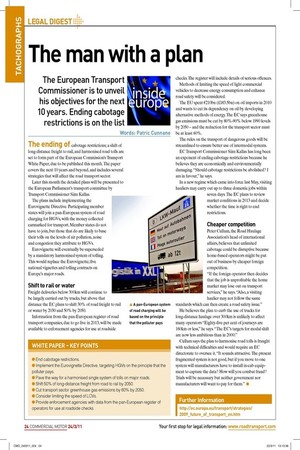The man with a plan
Page 19

If you've noticed an error in this article please click here to report it so we can fix it.
The European Transport Commissioner is to unveil his objectives for the next 10 years. Ending cabotage restrictions is on the list
Words: Patric Cunnane The ending of cabotage restrictions; a shift of
long-distance freight to rail, and harmonised road tolls are set to form part of the European Commission’s Transport White Paper, due to be published this month. The paper covers the next 10 years and beyond, and includes several strategies that will affect the road transport sector.
Later this month the detailed plans will be presented to the European Parliament’s transport committee by Transport Commissioner Siim Kallas.
The plans include implementing the Eurovignette Directive. Participating member states will join a pan-European system of road charging for HGVs, with the money collected earmarked for transport. Member states do not have to join, but those that do are likely to base their tolls on the levels of air pollution, noise and congestion they attribute to HGVs.
Eurovignette will eventually be superseded by a mandatory harmonised system of tolling. This would replace the Eurovignette; ive national vignettes and tolling contracts on Europe’s major roads.
Shift to rail or water
Freight deliveries below 300km will continue to be largely carried out by trucks, but above that
distance the EC plans to shift 30% of road freight to rail ▲ A pan-European system or water by 2030 and 50% by 2050. of road charging will be Information from the pan-European register of road based on the principle transport companies, due to go live in 2013, will be made that the polluter pays
available to enforcement agencies for use at roadside checks. The register will include details of serious offences.
Methods of limiting the speed of light commercial vehicles to decrease energy consumption and enhance road safety will be considered.
The EU spent €210bn (£183.5bn) on oil imports in 2010 and wants to cut its dependency on oil by developing alternative methods of energy. The EC says greenhouse gas emissions must be cut by 80%-90% below 1990 levels by 2050 – and the reduction for the transport sector must be at least 60%.
The rules on the transport of dangerous goods will be streamlined to ensure better use of intermodal systems.
EC Transport Commissioner Siim Kallas has long been an exponent of ending cabotage restrictions because he believes they are economically and environmentally damaging. “Should cabotage restrictions be abolished? I am in favour,” he says.
In a new regime which came into force last May, visiting hauliers may carry out up to three domestic jobs within seven days. The EC plans to review market conditions in 2013 and decide whether the time is right to end restrictions.
Cheaper competition
Peter Cullum, the Road Haulage Association’s head of international affairs, believes that unlimited cabotage could be disruptive because home-based operators might be put out of business by cheaper foreign competition.
“If the foreign operator then decides that the job is unproitable the home market may lose out on transport services,” he says. “Also, a visiting haulier may not follow the same standards which can then create a road safety issue.” He believes the plan to curb the use of trucks for long-distance haulage over 300km is unlikely to affect many operators “Eighty-ive per cent of journeys are 160km or less,” he says. “The EC’s targets for modal shift are now less ambitious than in 2000.”
Cullum says the plan to harmonise road tolls is fraught with technical dificulties and would require an EC directorate to oversee it. “It sounds attractive. The present fragmented system is not good, but if you move to one system will manufacturers have to install in-cab equipment to capture the data? How will you combat fraud? Trials will be necessary but neither government nor manufacturers will want to pay for them.” ■














































